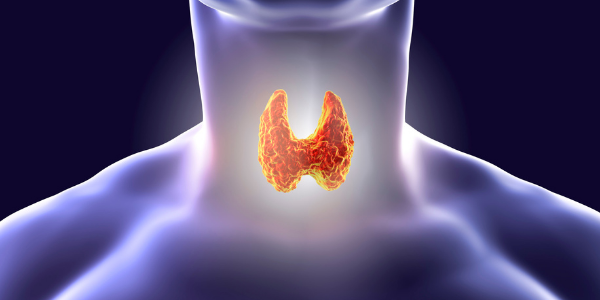
Thyroid Medications for Weight Management

Weight gain is often a symptom of hypothyroidism, or underactive thyroid.
When the thyroid doesn’t produce enough of the hormones thyroxine (T4) and triiodothyronine (T3), it impacts the metabolism as well as other important processes in the body.
Treating hypothyroidism and restoring your T3 and T4 levels improves metabolic function, which can lead to fat loss.
Read on to learn more about how the thyroid impacts weight, and how thyroid medication can benefit a weight loss plan.
Thyroid Conditions and Fat Gain
If you’re experiencing weight gain or having difficulty losing weight, it’s important to check for a thyroid condition. Underactive thyroid is a common but often overlooked cause of fat gain. Thyroid conditions in general are underdiagnosed and undertreated.
Many patients with hypothyroidism struggle to move the scale, regardless of how much they diet and exercise. This is a frustrating experience, and the root cause needs to be addressed to change the pattern.
Thyroid Hormones and the Metabolism
Thyroid hormones play a large role in regulating metabolism. In simple terms, metabolism refers to the process of converting food into energy for your body to use.
Of the two thyroid hormones, T3 is the active, while T4 is inactive and converted to T3 to be used. T3 helps manage your metabolic rate, or how many calories to utilize as fuel.
If your body doesn’t use enough of the calories you consume, they end up stored in the form of fat. This fat may accumulate in hard-to-lose areas like the stomach, thighs, upper arms, and other places. It also may collect around your organs, which is called visceral fat.
In addition to regulating metabolism, thyroid hormones are responsible for:
- Regulating heart rate and body temperature
- Influencing how food moves throughout the digestive tract
- Contributing to brain development
- Maintaining bone, hair, and skin cells
Diagnosing Hypothyroidism
To diagnose an underactive thyroid, patients typically need blood testing as well as symptom analysis.
Recommended tests include:
- Free T3 – This measures the amount of free, or unbound, T3 in your blood.
- Free T4 – This measures the amount of free, or unbound, T4 in your blood.
- Reverse T3 – This substance is produced when T4 is converted to T3, and it shows how your body is utilizing thyroid hormones.
- Thyroid Peroxidase Antibodies (Anti-TPO) – These antibodies can indicate an immune condition related to your thyroid, like Hashimoto’s Disease where the immune system attacks thyroid cells.
- Thyroglobulin Antibodies – Thyroglobulin is found within the thyroid, and its antibodies can point to a thyroid issue.

Other Hypothyroid Symptoms
If you have a thyroid issue, weight gain probably isn’t the only side effect you’re experiencing. You may also have hypothyroid symptoms like:
- Fatigue and a general lack of energy
- Brittle skin, hair, and nails
- Responding strongly to cold temperatures
- Constipation and other stomach issues
- Depression
- Slowed movements and thoughts
A knowledgeable provider can review your hypothyroid symptoms and test results to let you know the state of your thyroid health.
Thyroid Medication and Losing Fat
The main treatment for hypothyroidism is Thyroid Hormone Replacement Therapy.
Patients take medication that mimics the effects of thyroid hormone to ease symptoms and improve bodily function.
Thyroid Hormone Replacement Therapy often utilizes a synthetic T4 hormone called Levothyroxine to boost thyroid hormone levels. This treatment may also utilize a synthetic T3 medication called Liothyronine, or desiccated thyroid that contains a little of both hormones.
“Desiccated” refers to dried and powdered biologic material, in this case thyroid glands from animals. Desiccated thyroid may have more of an impact on weight loss, although this benefit has not been sufficiently studied.
An improved metabolism doesn’t guarantee weight loss, but it’s crucial to supporting a weight loss plan.
Thyroid hormone medication is not prescribed for weight loss, and it’s only effective for weight loss if you have a thyroid condition. For patients with hypothyroidism, optimizing thyroid hormone levels will lead to a healthier metabolism, which can in turn benefit body composition.
Many patients find that they reach their fat loss goals more easily once they treat their thyroid condition.
It’s important to maintain a healthy diet and exercise routine while starting. You may also want to look into additional weight loss aids to boost fat burn, improve energy, and more.

Hypothyroid Treatment at Defy Medical
Defy Medical offers individualized treatment for underactive thyroid, or hypothyroidism. With Defy Medical, you can access comprehensive testing, in-depth consults with experienced providers, a wide range of thyroid medication, and more.
We also offer fat loss programs, hormone replacement therapy, primary care, peptide therapy, and other health services.
Ready to learn more?
Get Started

